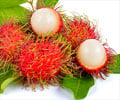Drinking a glass of 100 percent fruit juice has long been thought of as a healthy daily habit for both adults and children. However, people are somewhat confused especially about the quantity like how much to drink or how much to serve their children.
According to Dr. Theresa Nicklas, professor of pediatrics with Baylor College of Medicine, who has conducted research on juice consumption among children, parents should be confident serving their children appropriate amounts of 100 percent fruit juice.Appropriate amounts, as recommended by the American Academy of Pediatrics, are 4-6 ounces of 100 percent juice daily for children 1-6 years old, and 8-12 ounces daily for older children from ages 7-18. The AAP statement, as well as the USDA Food Guide Pyramid, includes guidelines for incorporating 100 percent juice as a fruit serving.
Here are a few other fruitful points about juice, from the Juice Products Association:
Are whole fruits a better source of nutrients than juice?
Not necessarily. The U.S. Dietary Guidelines recommend that a majority of consumers’ daily fruit servings come from whole fruit, but adults and children are notorious under-consumers of fruit. A serving of 100 percent fruit juice is a convenient way to help meet the recommended servings of fruit. Fruit juices also provide substantial contributions of several nutrients in higher amounts in the diet than do whole fruits, including vitamin C, folate and potassium. In addition, 100 percent fruit juice contains many naturally occurring phytonutrients that contribute to good health.
Does fruit juice have a lot of sugar and calories?
Advertisement
Does fruit juice make children fat?
Advertisement
Two recently published studies which investigated the relationship between 100 percent juice consumption and children’s bodyweight support the conclusion that consumption of 100 percent juice is not associated with overweight or risk of overweight among children. In fact, the research conducted by Dr. Nicklas and her colleagues also demonstrated that children consuming 100 percent juice had higher intake of certain nutrients, such as vitamin C, iron and folate, and lower intake of total fat, saturated fat and added sugar. Her study is based on the largest, ongoing government database on food consumption (NHANES - National Health and Nutritional Examination Survey).
Does fruit juice increase the risk of diabetes?
Extensive research has never linked juice intake with an increased risk for diabetes. A recent analysis of the most recent NHANES data (sponsored by the Juice Products Association, not yet published) has concluded that fruit juice consumption does not cause an increased incidence of metabolic syndrome (a precursor to pre- and type 2 diabetes) or negatively affect glucose or insulin levels. In fact, the data actually show that 100 percent fruit juice consumption is associated with a lower risk of metabolic syndrome.
Source-Newswise
SRM









